Germany train route map
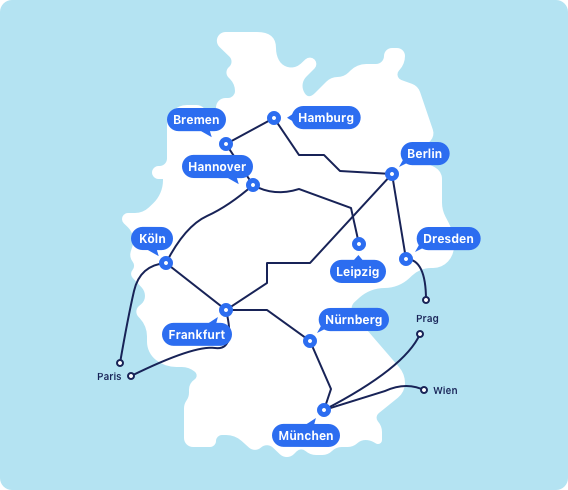

If you find trains for a cheaper price elsewhere, let us know and we'll refund the difference*

Save more with a variety of promo codes. Book on the TrainPal app with no booking fees.

24/7 fast customer service with prompt responses to your queries

Seamless rail travel with easy changes and refunds for peace of mind.

With a top speed of 330 km/h (205 mph), ICE trains take you to explore German cities and neighbouring countries. It is the preferred choice for long-distance travel. You can purchase Sparpreis, Super Sparpreis, or Flexpreis tickets for affordable and flexible ICE train travel.
ICE trains offer First and Second Class seating, both with comfortable seats and free WiFi. In First Class, you can generally enjoy more spacious and cosy seats with extra legroom, along with in-seat catering service. Additionally, First Class passengers with Flexpreis tickets normally have access to DB lounges.
ICE trains connect major German cities like Berlin, Hamburg, and Frankfurt, with popular routes including Berlin to Munich, Berlin to Hamburg and Cologne to Hanover. They also extend to neighbouring countries such as France and the Netherlands. Enjoy fast and comfortable travel on ICE trains!
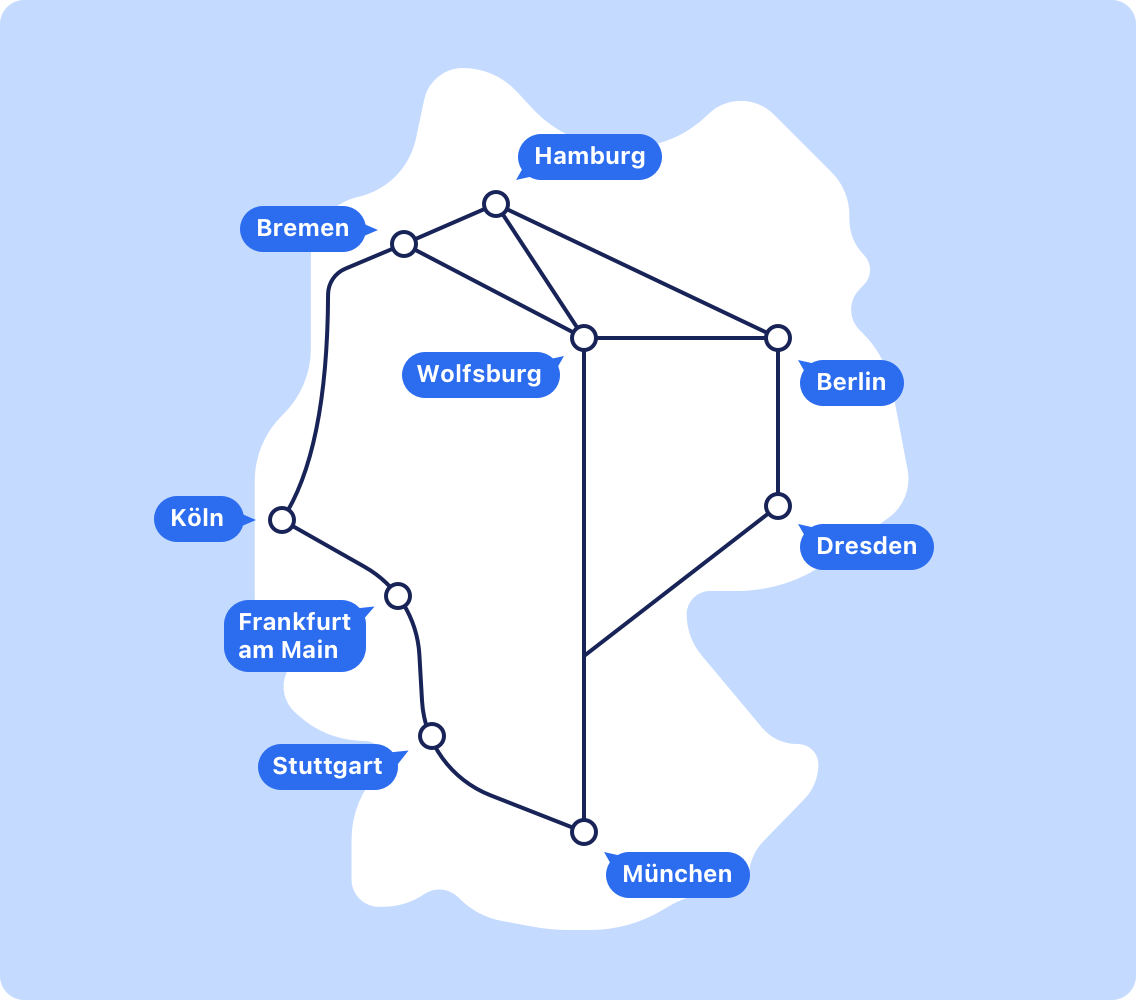
Intercity (IC) is a long-distance train service operated by German railways, providing connections between cities within Germany and neighbouring countries. You can buy Sparpreis tickets, Super Sparpreis tickets, or Flexpreis tickets to travel on IC trains. These choices offer both flexibility and cost-effectiveness for your trip.
Some IC trains offer free WiFi. IC trains offer First Class and Second Class seatings, both providing comfortable seats. In First Class, you can usually enjoy more spacious and cosy seating, and a quieter environment, and First Class passengers with Flexpreis tickets also have access to DB lounges at the station.
IC trains can reach a top speed of approximately 200 km/h (124 mph), efficiently transporting passengers between major cities in Germany, such as Cologne, Hamburg, and Hanover. Popular routes include Cologne to Frankfurt, Nuremberg to Munich and Hamburg to Augsburg. Additionally,IC trains provide services to international destinations, often to Austria and the Netherlands. Travelling by IC train is convenient and comfortable, making it an ideal choice for your journey.
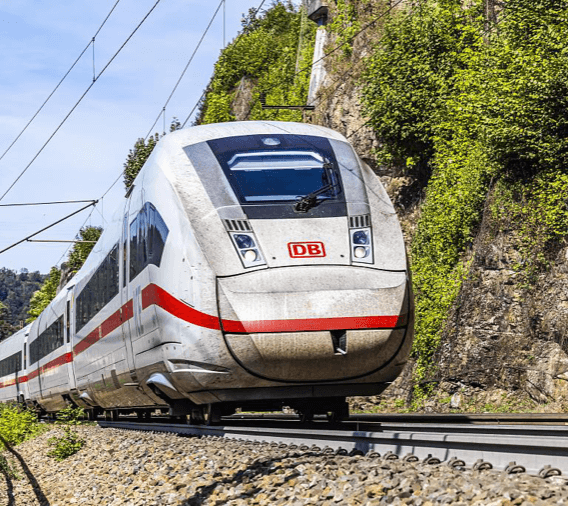
Regional and local trains in Germany, including Interregio Express (IRE), Regional Express (RE), Regionalbahn (RB), and S-Bahn services, are mainly operated by Deutsche Bahn. These trains offer comfortable seating, high frequency, and seamless integration with buses, trams, and U-Bahn systems, ensuring convenient travel throughout Germany.
IRE trains provide efficient medium-distance travel between regional hubs and key cities. RE trains connect smaller towns with larger cities, bridging the gap between local S-Bahn services and long-distance trains. RB trains are essential for linking smaller towns and rural areas with larger cities and regional hubs through reliable and frequent local services.
S-Bahn trains are crucial for urban and suburban transportation, offering fast and frequent services within metropolitan areas, and connecting city centres with surrounding suburbs and neighbouring towns for easy and efficient commutes.
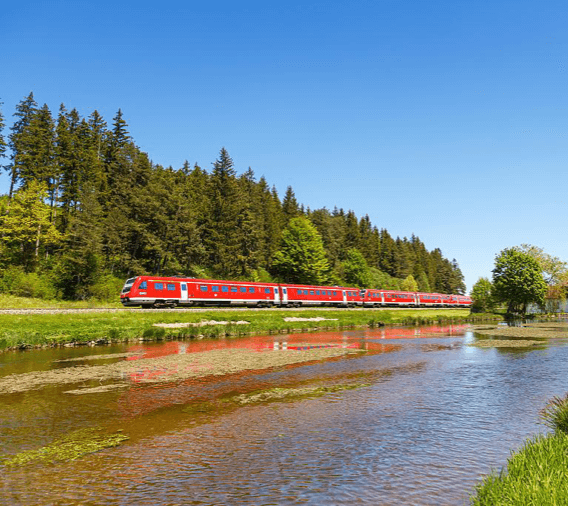
German airports such as Frankfurt Airport, and Hamburg Airport are well-connected by trains. S-Bahn trains, regional trains, ICE trains, and other trains provide convenient transportation and excellent service, ensuring your travel is smooth and worry-free. Check out more information on German airport trains and start planning your trip today.
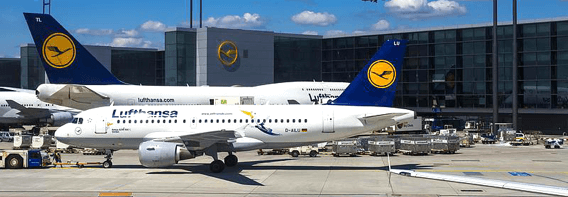
Frankfurt Airport, located southwest of Frankfurt city centre, features two train stations. The Frankfurt (Main) Airport Regional Station (Frankfurt Flughafen Regionalbahnhof) connects to Frankfurt (Main) Hbf and Hanau Hbf via RE and S-Bahn trains.
The Frankfurt (Main) Airport Long-Distance Station (Frankfurt am Main Flughafen Fernbahnhof) is a 10-minute walk from Terminal 1. It is served by ICE trains, offering connections to major cities in Germany and Europe, including Munich, Cologne, Stuttgart, Berlin, Amsterdam, Brussels, and Vienna.
Nearest train station:
Train operator(s):
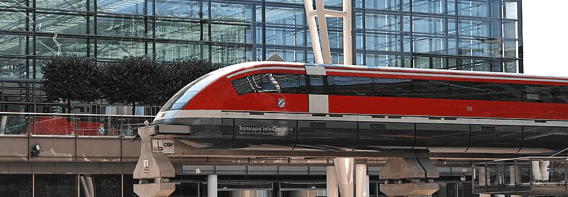
Munich Airport, located northeast of Munich, features two train stations: Munich Airport Terminal Station (Flughafen München) and Visitors Park (Besucherpark). The Munich Airport Terminal Station connects to Munich city centre via S1 and S8 S-Bahn trains in approximately 40 minutes. Additionally, RE 22 trains link the airport with nearby cities and towns, including Regensburg, Landshut, Moosburg, and Freising.
Nearest train station:
Train operator(s):
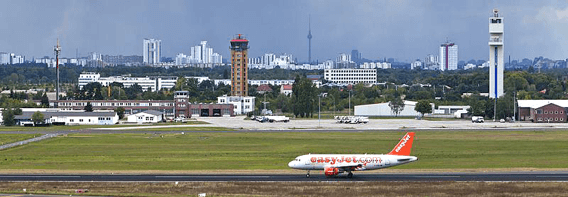
Berlin Brandenburg Airport, located south of Berlin, features the BER Airport Station (Flughafen BER) under Terminal 1 on level U2. The station connects to the Berlin city centre via S-Bahn trains (S9, S45) and to cities like Potsdam, Rostock, and Chemnitz via Regional and InterCity trains.
Nearest train station:
Train operator(s):
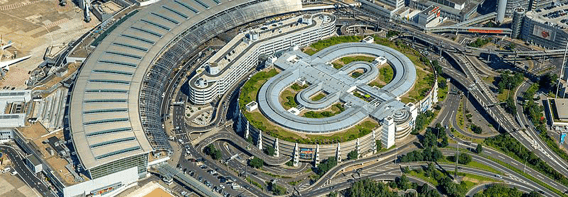
Düsseldorf Airport has two train stations: Düsseldorf Flughafen (Airport) Station and Düsseldorf Flughafen Terminal. The Terminal Station, located underground, connects to Düsseldorf city centre via S-Bahn (S11) trains. Düsseldorf Flughafen (Airport) Station, linked to the terminals by SkyTrain, is served by ICE, IC, and regional trains to cities like Hamm, Essen, Dortmund , and Cologne. Eurostar also connects this station to European cities like Paris and Brussels.
Nearest train station:
Train operator(s):
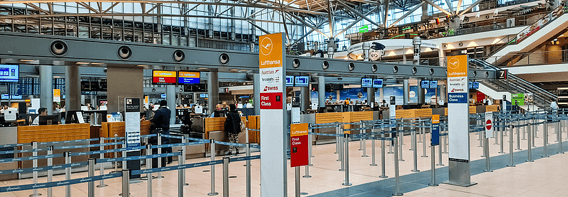
Hamburg Airport (Flughafen) station is conveniently located within the airport, easily accessible from the terminals by following the signs. The S-Bahn S1 train connects the station to Hamburg Central Station in just 25 minutes, with trains departing every 10 minutes.
Nearest train station:
Train operator(s):
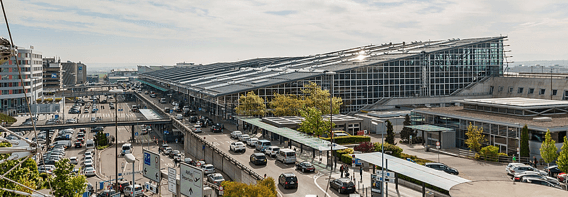
Stuttgart Flughafen/Messe station is located underground, within walking distance of the airport terminal. The S-Bahn S2 and S3 trains from Stuttgart Central Railway Station reach the airport in 27 minutes, providing direct access to the terminal.
Nearest train station:
Train operator(s):
Germany international trains offer a seamless and efficient way to travel across Europe. For example, DB international and Eurostar trains connect Germany with numerous European destinations, providing a comfortable and pleasant travel experience.
Deutsche Bahn (DB) offers a range of international trains that seamlessly connect Germany with over 10 neighbouring countries, including Austria, France, Italy, Belgium, Denmark, and the Netherlands.
Key services include high-speed trains like the ICE and IC, which provide rapid connections to major European cities such as Paris, Brussels, Amsterdam, and Zurich. These trains offer a comfortable and fast alternative to air travel and are well-integrated with local and regional transport networks, ensuring easy continuation of your journey within Germany and beyond.
Popular routes include Munich to Vienna, Hamburg to Copenhagen, Frankfurt to Paris, and Munich to Zurich. These routes effortlessly link Germany with other European countries, allowing you to explore multiple destinations and enjoy a smooth, efficient, and pleasant travel experience.
Eurostar offers high-speed international train services, making it easy to travel from Cologne, Düsseldorf, and Dortmund to Brussels and Paris. From there, you can connect to other Eurostar train s to London and Amsterdam, or other high-speed trains across Europe. Popular Eurostar routes include Cologne to Paris, Cologne to Brussels and Düsseldorf to Paris.
Starting November 4, 2024, Eurostar will introduce new travel classes: Standard, Plus, and Premier. All classes feature free WiFi and plug sockets. Standard and Plus allow two pieces of luggage plus a small backpack or handbag, while Premier allows an additional piece of luggage and provides access to exclusive lounges in Paris, Brussels, Amsterdam, Rotterdam, and Schiphol Airport. Experience the comfort and convenience of Eurostar's international trains for your travels.
Germany offers a variety of train tickets, including Super Saver fare, Saver fare, and Flexible fare, to meet different travel needs. Check more details with TrainPal and enjoy the benefits of efficient and pleasant train travel!
The Super Saver fare (‘Super Sparpreis’ in German) is a budget-friendly ticket option for long-distance travel. Children 6-14 travel free with someone 15 or older.
The Saver fare (‘Sparpreis’ in German) provides travellers with reduced ticket prices. Children 6-14 travel free with someone 15 or older.
Travel stress-free with Flexible fare (‘Flexpreis’ in German) on any train on your travel day. Ticket prices are subject to train routes and times.
When travelling by train in Germany, you can choose between First and Second Class. Both classes ensure a reliable and efficient travel experience. Here’s what each class offers:
Second Class offers an affordable travel experience for all passengers. The services differ based on the train type but typically include:
First Class offers a premium travel experience with enhanced comfort and exclusive services. The specific services vary depending on the type of train, but usually include:
The German Rail Pass offers a cost-effective method for passengers to explore Germany. Visitors can choose from two main types of rail passes: the Interrail German Pass and the Eurail German Pass, providing flexibility to suit your travel needs.


View details


View details
When travelling with Deutsche Bahn (DB), you may be eligible for compensation if your train arrives late at the destination station. If your train is delayed by 60 minutes or more, you are entitled to a 25% refund of the single ticket price. For delays of 120 minutes or more, the refund increases to 50% of the single ticket price.
You have the option to receive your compensation either as a voucher or as a cash refund. However, please note that refunds amounting to less than €4 will not be issued.
All European railways, including Deutsche Bahn (DB), update their timetables on the second Saturday of December each year, known as the Big Annual Timetable Change. During this period, German railways typically shorten the booking window from 6 months to 60 days for travel dates after the mid-December timetable change.
If you want to book the DB summer timetable for 2025, you can search for trains on TrainPal when the booking period returns to the regular 6 months, which is usually after mid to late December.
For Flexible Fare single tickets with Deutsche Bahn (DB), the validity depends on the distance of your journey. For journeys within 100 km, the ticket is valid only on the date specified on the ticket. For journeys over 100 km, you must start your journey on the date indicated on the ticket, but you can interrupt your trip and continue later (e.g., the next day) as long as the departure and destination stations remain the same.
ICE (InterCity Express) trains are renowned for their impressive speed and efficiency. With a top speed of 330 km/h (205 mph), they offer swift and comfortable transportation across Germany. Ideal for commuting between major cities or exploring the country, ICE trains provide a quick, reliable, and pleasant travel experience.
ICE train tickets are most affordable when booked in advance. Here’s how to get the best deals:
Book in Advance: ICE tickets can be booked up to 180 days ahead of time. The cheaper seats sell out quickly, so the earlier you book, the better the price.
Take Advantage of Sparpreis Fares: Sparpreis fares are the economical fare type offered by Deutsche Bahn, providing up to 85% off a full-price ticket. These fares are very popular, so it’s best to book well in advance to secure the lowest prices.
To get the best deals on ICE train tickets, plan ahead and look for Sparpreis fares.
Seat reservations on ICE trains vary by class and booking conditions. For individual travelers, second-class reservations cost €4.90, while first-class reservations cost €5.90 if they are not booked with the ticket.
Flexible fare for First Class tickets includes seat reservations. Family reservations are €9.80 in Second Class and €11.80 in First Class if not booked with the ticket.
Seat reservations are included in the Group Saver fare for group bookings.
Yes, booking train tickets in advance in Germany is usually more economical, particularly for long-distance journeys. Early reservations allow you to access the lowest prices before they increase. Most trains in Germany allow reservations starting 180 days in advance.